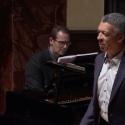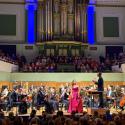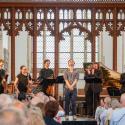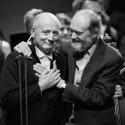The Royal Opera’s Boris Godunov production made the short trip from Covent Garden to South Ken for the company’s appearance at the 2016 Proms. The opera (here in its original 1869 version) is a good choice for concert presentation: as Antonio Pappano writes in the programme, much of its music approaches oratorio. That is particularly true of the choral numbers, and the work is a tour de force for the Royal Opera Chorus. But every aspect of the music is this production is strong, so the gains balanced the losses, despite the minimal visual presentation.
Little of Richard Jones’s visual presentation was retained, just the costumes and some of the Personenregie. Thankfully absent was the mime re-enactment of the Tsarevich’s murder, which is repeated ad nauseam in the staging. Without it, the conception is more straightforward, with the attention appropriately focused on Godunov himself, especially in the final scene. The interaction between the chorus, arranged around the back of the orchestra, and the leads was established in the opening scene with the police officer Nikitch (the first impressive bass of the evening, Jeremy White) and the suitably creepy Shiusky of John Graham-Hall addressing them from the front of the stage, from the start embracing the expansive performance space, and with it, the huge venue.
The Welsh lilt in Terfel’s Russian was always apparent
Bryn Terfel (main picture) appeared as Boris for the coronation scene above the chorus, at the organ console. His resplendent robes made this an impressive entrance, but his soft-grained baritone struggled to carry from the distance. More problematic were the off-stage bells, placed high in the gallery, but still too loud and overpowering both the orchestra and chorus. A rare mis-step though, in an otherwise well-balanced presentation.
The scene in the Chudov Monastery introduced the spectacular bass voice of Ain Anger as Pimen. Even in a cast dominated by low male voices Anger stood out for the presence and authority of his tone. David Butt Philip was just as convincing as Grigory the novice-cum-false-Dmitry, looking and sounding sufficiently young to make the role credible. No chance of getting the chorus off-stage to accompany his monologue though, so they just had to sing very, very quietly.
One of the highlights of this production at Covent Garden was John Tomlinson’s comic turn as Varlaam in the border scene. Sadly, Tomlinson wasn’t here this evening, but Andrii Goniukov (pictured below) was just as good. Goniukov had been made up (make-up another of the few visual elements retained) to look almost identical to Tomlinson in the role, long beard and all. His double act with Harry Nicoll’s Missail – playing spoons – was pitch perfect.

But the final scenes belonged to Bryn Terfel. Now front of stage, any concerns about projection were laid to rest. The absence of staging here gave even greater power to the personal interactions, Godunov’s anger at the Simpleton, frustrated rage with Shiusky and tender affection for Fyodor. The Welsh lilt in Terfel’s Russian was always apparent, yet the clarity of his diction was superlative. And the focused concentration he brought gave the death scene a claustrophobic intimacy unchallenged by the scale of the venue.
Top honours, then, for Terfel, the star attraction, but in a performance strong on all counts. And a final word of praise for Antonio Pappano, whose strong grip on the score has been a key factor in the success of this production. His tempos here are suitably rigorous, with rubato used sparingly, to articulate large-scale structure rather than to decorate individual phrases. There was also a strong feeling that he was leading an integrated team, an ensemble that knows the piece intimately and is able get the very best from it, even in these alien surroundings. A very promising start to the opera strand in this year’s Proms.













Add comment